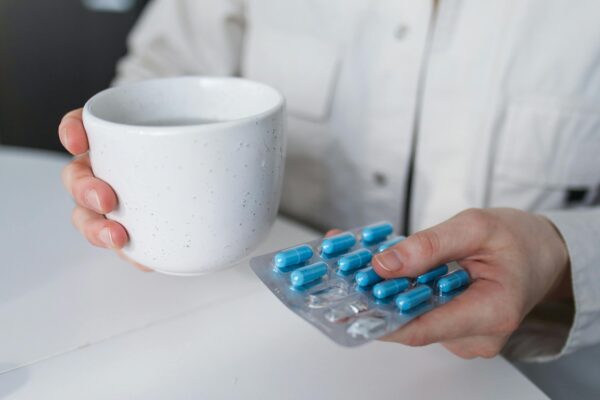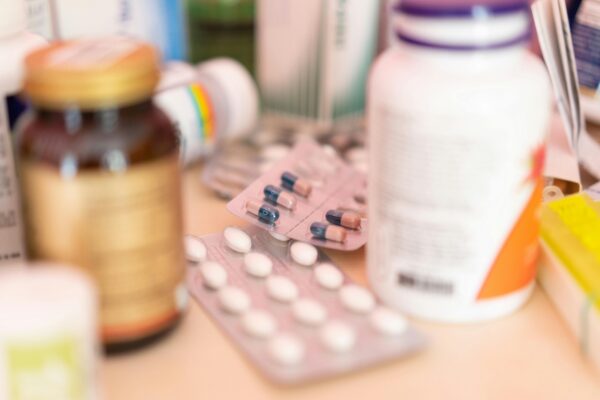- Can low testosterone cause ED?
- Low Testosterone and Erectile Dysfunction
- Research on how testosterone makes you harder
- Testosterone and Nitric Oxide
- Testosterone replacement therapy in men with Erectile Dysfunction
- Erectile dysfunction as the result of multifactorial pathologies
- Studying the effectiveness of transdermal testosterone gel
- Normalization of testosterone levels with supplementation
- The metabolic syndrome improvements by T
- Testosterone as a part of therapy ED
- Aging, ED, and Low Testosterone
- Can testosterone make you harder? Conclusion
- FAQs: Does Testosterone Make You Harder?
- Question: Can low testosterone cause erectile dysfunction (ED)?
- Question: How does testosterone contribute to erectile function?
- Question: Is testosterone replacement therapy effective for men with erectile dysfunction?
- Question: Is testosterone the only treatment option for erectile dysfunction?
- Question: What is the relationship between testosterone and the metabolic syndrome?
- Question: What are the age-related effects of low testosterone?
- Question: Is testosterone therapy beneficial for erectile dysfunction in combination with other treatments?
- Question: Are there any ongoing research or clinical trials on testosterone therapy?
- Sources
Can low testosterone cause ED?
There is ample evidence to support the concept that testosterone (T) is the fuel for male sexual function. So, does testosterone make you harder? Short answer: yes.
But, if you read this blog, you know that there are no magic pills. Your body is a complex mechanism. Each case is very individual.
Let’s see what the science knows about how testosterone can help your penis get harder and make you feel better.
Low Testosterone and Erectile Dysfunction
Penile erection is a complex physiologic process. Your erection depends on many factors and is based on a balance of neurotransmitters, vasoactive agents, endocrine factors, and tissue fibroelastic properties.
Erectile dysfunction can be caused by an alteration in any of the previously mentioned. For instance, changes in the corpus cavernosal structure may lead to erectile dysfunction.
Testosterone plays an essential role in developing and maintaining men’s secondary sexual characteristics.
Testosterone is also important for the development of male sexuality and the erection of the male penis.
Hypogonadism is known adversely affects the frequency of sexual desires, fantasies, and sexual intercourse.
Furthermore, androgen deprivation, irrespective of mode, is also proven to significantly reduce erectile function. Many studies show that erectile function and sexual activity were lost in men receiving androgen deprivation therapy (ADT) The frequency, magnitude, duration, and rigidity of nocturnal erections and libido were also markedly decreased in patients on ADT concluding that testosterone depletion severely suppresses erectile function and sexual activity.
Low testosterone levels occur in at least 6% of all ED patients. Many cases of erectile dysfunction happen in the setting of decreased plasma testosterone, where there is no complete absence of total testosterone.
Guys with low free testosterone usually suffer from organic erectile dysfunction versus psychogenic erectile dysfunction. This may be due to alterations in corpus cavernosal structure and function at the cellular level caused by testosterone deficiency.
In fact, in one study, men with organic erectile dysfunction had a 40% decrease in free testosterone.
Research on how testosterone makes you harder
Many of the original studies admitted the relationship between testosterone and erectile dysfunction was performed on castrated rats and rabbits. And scientists now have a better understanding of the effect of hypogonadism on male erection.
Intracavernosal pressures (ICP) were used to assess erectile function. Following stimulation of the pelvic nerve, ICP was significantly reduced in the castrated rabbit compared to the control. The Testosterone treatment helped restore erectile function to the baseline.
In another study, there was an appreciable decline in the intracavernous to systemic arterial pressure ratio in castrated rabbits without significant changes to systemic systolic and diastolic blood pressures. Of note, castration did not affect rabbit ICP in the flaccid state compared to the control.
In animal models, androgen ablation (castration/deprivation) predisposes smooth muscle changes and cavernosal atrophy compromising erectile function. It was shown that castration reduced smooth muscle tissue content and increased connective tissue content in the rabbit corpus cavernosum.
- Androgen deprivation caused a decrease in smooth muscle and an increase in the extracellular matrix of the corporus cavernosum causing a resulting decrease in cavernosal compliance and preventing penile engorgement and venous occlusion. The presence of fat cells (adipocytes) in the subtunical space interfered with the proper venue-occlusive mechanism and contributed to venous leakage resulting in erectile dysfunction in the androgen-deprived animal.
It is hypothesized that in the penis, testosterone plays a role in promoting the differentiation of progenitor stroma cells into myogenic cells and the absence of androgens (low testosterone levels) redirects the pathway toward the production of fat cells and fat accumulation.
Interestingly, androgen replacement in the castrated rabbit prevented smooth muscle changes in the corpus cavernosum.
Testosterone replacement also induced vascular smooth muscle growth.
There is also a strong positive correlation between testosterone concentrations and the degree of trabecular smooth muscle relaxation in the penis.
This suggested a positive relationship between free T with vessel dilation and penile elasticity/cavernous artery compliance.
- Testosterone’s role in penile erections at the cellular level is supplemented by data showing its influence at the biochemical level. Testosterone is known to affect the production of two enzymes; nitric oxide synthase (NOS) and phosphodiesterase 5 (PDE5) also known as inhibitors in the treatment of erectile dysfunction
Several studies showed that androgen deprivation reduced nitric oxide synthase expression and activity (rabbit models do not concur). In the rat penis, NOS activity decreased by 45% after castration. This change was prevented by testosterone replacement.
Testosterone and Nitric Oxide
Nitric oxide is one of the most important molecules for blood vessel health, raises blood supply, and lowers blood pressure. Also, it helps protect tissues from damage due to low blood supply.
In one study there was a close relationship between testosterone and nitric oxide (NO) in the body. In this study, NOS-containing nerve fibers were decreased and erectile function was lost in orchiectomized rats. And although the presence of NOS-containing nerve fibers was not completely eliminated in the castrated rat, it was severely diminished.
Furthermore, immediate testosterone replacement following castration preserved NOS-containing nerve fibers and erectile function in these rats. Likewise, rats that received testosterone therapy 8 weeks after castration showed little change in the number of NOS-positive nerve fibers and no change in erectile response compared to the noncastrated controls. This reduction in NOS nerve fibers is postulated to be one of the contributing factors to a decreased ICP and a longer latency period in response to pelvic nerve electrostimulation.
- As previously stated, testosterone also affects the transcription of PDE5. PDE5 gene expression is 10 to 100 times more abundant in male corpora cavernosum tissue than in any tissue of the male or female body. In the study by Morelli et al., PDE5 and protein levels in the rabbit corpora cavernosum were decreased in hypogonadal rabbits in comparison to eugonadal rabbits. As might be expected, PDE5 levels were restored to that of the control group with testosterone administration. This association helps explain the lower level of erectile responsiveness of hypogonadal men to PDE5 inhibitors.
Testosterone maintains a proper synthesis and/or release of neurotransmitters, receptor function, and tissue structure and function in the corpus cavernosum. Testosterone levels are critical in the maintenance of neural and smooth muscle functionality – shown by a diminution in erectile response to cavernosal nerve stimulation in the castrated animal.
In conclusion, testosterone is crucial in the initiation and maintenance of the male penile erection.
Testosterone replacement therapy in men with Erectile Dysfunction
As more evidence is produced relating to the association between testosterone and erectile and or sexual dysfunction, testosterone replacement therapy, especially in hypogonadal patients, has become a safe and efficacious treatment for the improvement of male sexual performance.
In many studies, testosterone replacement therapy additionally offered improvement in lean muscle mass, a decrease in body fat, and an increase in bone mass. As in erectile function, these improvements were seen in hypogonadal (with low testosterone) men.
From this evidence, it has become generally accepted that testosterone monotherapy is effective for the treatment of erectile dysfunction in hypogonadal men who have no further contributing pathology and other health issues.
Erectile dysfunction as the result of multifactorial pathologies
But in many cases, erectile dysfunction is the result of multifactorial pathologies, and therefore testosterone is not the only treatment option for all guys with erectile problems.
However, treatment may help to restore normal testosterone levels to achieve a normal erectile function and may be useful in combination therapy.
A recent study has shown an inverse correlation between testosterone levels in men with type 2 diabetes and a positive correlation between waist circumference relationship with severity of erectile dysfunction.
Other studies have shown a distinct improvement in erectile function in men receiving testosterone replacement therapy.
Studying the effectiveness of transdermal testosterone gel
In a randomized, double-blind, placebo-controlled trial conducted to evaluate the efficacy of transdermal testosterone gel in hypogonadal men, there was a significant increase initially in total testosterone at 1-2 months.
Free testosterone levels paralleled the increases seen in total testosterone levels while the placebo group revealed no significant change in T.
The study concluded that transdermal testosterone gel acts to restore testosterone levels to physiologic levels with resultant improvement in sexual function.
Normalization of testosterone levels with supplementation
Similarly, Mulhall evaluated the normalization of testosterone levels in hypogonadal men and the short- and long-term effects on erectile function. All 32 patients in the study reached physiologic testosterone levels with supplementation after 1 month of treatment. However, the improvement was not maintained at 3- and 6-month follow-up visits.
Finally, in a meta-regression analysis, testosterone replacement resulted in significant improvement in sexual function in studies in men with low and low-normal testosterone levels, and the effect of testosterone on erectile function was inversely related to the baseline serum testosterone level.
Still, further studies support the use of testosterone replacement therapy to ameliorate erectile dysfunction and interestingly show improvements in other deleterious health issues such as those germane to the metabolic syndrome.
The metabolic syndrome improvements by T
The metabolic syndrome is described in patients who exhibit derangements in blood pressure, cholesterol levels, insulin sensitivity, and central adipose tissue accumulation.
Recently, due to the presence of features of the metabolic syndrome, further metabolic alterations in hormones, specifically, testosterone, render many of these guys impotent.
Therefore, hypogonadism may be a pertinent feature of the metabolic syndrome and testosterone replacement therapy lends evidence to improvements in not just the metabolic syndrome but erectile dysfunction.
Multiple interventional studies have shown the improving effects of testosterone replacement on central obesity, glucose regulation, serum lipid levels, and blood pressure in patients diagnosed with metabolic syndrome.
In their randomized, no-treatment controlled study on testosterone supplementation in men with type II diabetes, obesity, and partial hypogonadism, Boyanov investigated the effects of oral testosterone on the components of metabolic syndrome and androgen deficiency. Their results in forty-eight men with type II diabetes showed a significant improvement in body weight and BMI, body fat, sexual function, glucose insensitivity, and serum testosterone levels.
In a double-blind placebo-controlled study using testosterone esters administered intramuscularly, Kapoor found that testosterone improved insulin resistance, glycemic control, cholesterol levels, and waist circumference.
Additional studies have shown the beneficial effects of testosterone replacement in hypogonadal men with regard to increasing muscle mass, strength, sexual function, energy, and a decrease in fat mass.
Testosterone as a part of therapy ED
The aforementioned studies reveal the importance of testosterone for guys with erectile dysfunction. But, It is important to understand that erectile dysfunction can be the result of multiple contributing factors and testosterone may be effective in combination therapy.
Erectile dysfunction has been demonstrated to be multifactorial in nature, thus requiring a multi-modality approach toward treatment. Erectile dysfunction often occurs secondary to a pathological process frequently associated with aging. These two origins commonly involve a reduction in levels of testosterone and it has been proposed that this hypogonadism perpetuates erectile dysfunction.
Testosterone performs multiple normal physiologic functions throughout life from promoting male maturation to supporting spermatogenesis and finally affording men habitual sexual behavior and function.
Aging, ED, and Low Testosterone
Low testosterone is a common issue that affects men as they age.
Low T levels contribute to sexual dysfunction in the elderly. The European Male Aging Study (EMAS) performed on 3369 men between 40–79 years of age, showed that three sexual symptoms (poor morning erection, low sexual desire, and erectile dysfunction) t were significantly associated with a low serum T.
Combined with an unhealthy lifestyle, accompanied by weight gain, dyslipidemia, and type 2 diabetes, it is not uncommon for men to experience not only erectile dysfunction but also problems with mood, self-confidence, and sexual desire.
Low T levels have related to depressive symptoms in older men. The Rancho Bernardo Study, a cross-sectional population-based study performed on 856 community-dwelling older men, 50–89 years old, showed that depressed men had significantly lower levels of T than those without depression.
Can testosterone make you harder? Conclusion
Restoring testosterone to normal levels contributes to the man’s ability to achieve erectile function.
Erectile dysfunction can manifest itself for a number of secondary reasons, and testosterone alone may not be enough. Therefore, testosterone is often used in combination therapy to restore erectile function.
Erectile dysfunction is often indicative of additional detrimental cardiovascular disease, and through its beneficial metabolic effects, testosterone may provide greater protection against devastating cardiac and vascular episodes, as well as restore erectile and sexual function. Some of the limitations of our knowledge of the benefit/risk ratio of testosterone therapy are causing a great need for large randomized controlled clinical trials.
FAQs: Does Testosterone Make You Harder?
Question: Can low testosterone cause erectile dysfunction (ED)?
Yes, there is ample evidence supporting the link between low testosterone levels and erectile dysfunction. Testosterone plays a crucial role in developing and maintaining male sexual function.
Question: How does testosterone contribute to erectile function?
Testosterone is important for the development of male sexuality and the erection of the male penis. It affects the balance of neurotransmitters, vasoactive agents, endocrine factors, and tissue properties involved in the process of penile erection.
Question: Is testosterone replacement therapy effective for men with erectile dysfunction?
Yes, testosterone replacement therapy has shown to be a safe and effective treatment for improving male sexual performance, especially in hypogonadal men. It may also offer other benefits such as increased lean muscle mass and improved bone health.
Question: Is testosterone the only treatment option for erectile dysfunction?
No, erectile dysfunction can have multiple underlying causes, so testosterone alone may not be sufficient for all cases. It is important to consider other contributing factors and explore combination therapy approaches to address erectile dysfunction effectively.
Question: What is the relationship between testosterone and the metabolic syndrome?
Studies have shown that testosterone replacement therapy can have positive effects on the metabolic syndrome, which includes issues like obesity, insulin resistance, and abnormal lipid levels. Testosterone supplementation has been associated with improvements in body composition, glucose regulation, and lipid profiles.
Question: What are the age-related effects of low testosterone?
Low testosterone is common in aging men and can contribute to sexual dysfunction, including erectile dysfunction. It is often associated with other health issues such as mood disturbances, reduced self-confidence, and decreased sexual desire.
Question: Is testosterone therapy beneficial for erectile dysfunction in combination with other treatments?
Yes, erectile dysfunction is a complex condition that may have multiple contributing factors. Testosterone therapy can be effective in combination with other treatments to address the underlying causes and restore erectile function.
Question: Are there any ongoing research or clinical trials on testosterone therapy?
There is a need for large randomized controlled clinical trials to further explore the benefit/risk ratio of testosterone therapy and its effects on erectile dysfunction and overall health.
Sources
- Wang C, Swerdloff RS, Iranmanesh A, Dobs A,Snyder PJ, Cunningham G, Matsumoto AM, WeberT, Berman N, Testosterone Gel Study Group: Transdermal testosterone gel improves sexual function, mood, muscle strength, and body composition parameters in hypogonadal men. J Clin Endocrinol Metab 2000;85:2839–2853.
- Zitzmann M, Faber S, Nieschlag E: Association of specific symptoms and metabolic risks with serum
testosterone in older men. J Clin Endocrinol Metab 2006;91:4335–4343. - Kshirsagar A, Seftel A, Ross L, Mohamed M, Niederberger C: Predicting hypogonadism in men based upon age, presence of erectile dysfunction, and depression. Int J Impot Res 2006;18:47–51.
- Nasser M: Does testosterone have a role in erectile function? Am J Med 2006;119:373–382.
- Martínez-Jabaloyas JM, Queipo-Zaragozá A, Pastor Hernández F, Gil-Salom M, Chuan-Nuez P: Testosterone levels in men with erectile dysfunction. BJU Int 2006;97:1278–1283.
- Rhoden EL, Telöken C, Sogari PR, Souto CA: The relationship of serum testosterone to erectile function in normal aging men. J Urol 2002;167:1745–1748.
- Tsujimura A, Matsumiya K, Matsuoka Y, Takahashi T, Koga M, Iwasa A, Takeyama M, Okuyama A: Bioavailable testosterone with age and erectile dysfunction. J Urol 2003;170:2345–2347.
- Feldman HA, Goldstein I, Hatzichristou DG, Krane RJ, McKinlay JB: Impotence and it’s medical and psychological correlates: results of the Massachusetts
male aging study. J Urol 1994;151:54–61. - Yue P, Chatterjee K, Beale C, Poole-Wilson PA,
Collins P: Testosterone relaxes rabbit coronary arteries and aorta. Circulation 1995;91:1154–1160. - Webb CM, McNeill JG, Hayward CS, de Zeigler D, Collins P: Effects of testosterone on coronary vasomotor regulation in men with coronary heart disease. Circulation 1999;100:1690–1696.
- Bodie J, Lewis J, Schow D, Monga M: Laboratory evaluations of erectile dysfunction: an evidence-based approach. J Urol 2003;169:2262–2264.
-
Testosterone Therapy Improves Erectile Function and Libido in Hypogonadal Men
- DISCLAIMER: THIS WEBSITE DOES NOT PROVIDE MEDICAL ADVICE
The information, including but not limited to, text, graphics, images and other material contained on this website are for informational purposes only. No material on this site is intended to be a substitute for professional medical advice, diagnosis, or treatment. All Products recommended here are selected by our editorial team. Some of our articles include affiliate links. If you buy something from one of these links, we may receive an affiliate commission at no cost to you, but it helps us share free quality content with you.
Post navigation
Begin typing your search term above and press enter to search. Press ESC to cancel.






4 thoughts on “Does testosterone make you harder?”